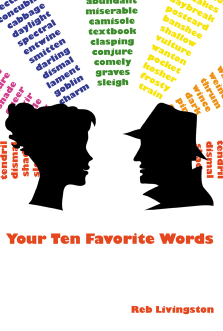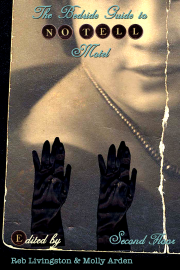Thought
Maybe what we should have done -- instead of calling the anthology "The Bedside Guide to No Tell Motel" (a title that apparently makes no "authoritative claims" and therefore offends no one's precious sensibilities) -- was instead title it "The Most Fuckable Poems of 2005."
We'd have a higher Amazon ranking.
Hmm . . . maybe next year.
And also, we're going to include a key so it will be 100% transparent what Molly's and my relationships are with the contributors. It'll look something like this:
Symbol - Meaning
Winking Eye - Somebody Who's Published Our Poems
Dollar Sign - Somebody Who Paid Us To Publish His/Her Poem
Gun - Somebody Who's Blackmailing/Threatening Us
Cocktail Glass - Drinking Buddy
Mizpah Charm - Best Friend
House - Relative
Two Tongues Tied - Kissing Cousin
Hand Grabbing Ass - Somebody We Hope Will Bang Us Now That We've Published Him/Her
Hand Grabbing Breast - Former Teacher/Student
Two Bodies Humping - Current Teacher/Student
Clenched Fist - Recipient/Giver of Tug Job
Because that's what books are about.






14 Comments:
OMG, your symbols are hilarious. I love it. Especially the clenched hand.
Shall we nominate Seth to be your official "biting humor muse"? This is off the wall funny.
(BTW...my wife read your previous post and was nodding the entire time.)
Sure, you could call it The Most Fuckable Poems of 2005, but the question is, can the anthology deliver on that promise?
I'm not sure Lulu is set up for that.
:-)
S.
I totally want to do an anthology consisting only of people I have poetry crushes on. You're invited!
Personally, I'd want the hand-grabbing-ass by my name.
Reb, I know it's damn impolite of me to ask, but do you believe "That's Not Butter" is one of the best poems published in America in 2005?
Nope, I don't even think it's the best poem *I* published in 2005.
Of course, I'm not the editor.
Does Billy Collins think it's one of the best poems published in 2005? I don't know. It was his call and he made it and I appreciate the nod.
For every poet I know that thinks the Creeley and Hejinian years were the best, I know a poet that thinks those were the worst.
Sure the word "Best" is brash and smug -- it seems to me, that's kind of the point. On some level, just about all anthologies are claiming to select the "best" -- every year a new poet edits the anthology and makes his/her selections -- that's what's interesting and valuable about BAP -- seeing what so-and-so selects -- there are unlimited possibilities of what might appear -- and it all depends on who's this year's editor
Thanks for answering the question, Reb—though I wish you would have been willing to defend your work on its merits. That would have implied a kind of seriousness that I find sorely lacking in mainstream American culture, and which I hope to find when I turn to poetry. Unfortunately, I think there are a great many poems (though by no means all!) in the BAP series whose authors would be similarly unwilling to stick their necks out and say, Yes, this work is more accomplished, affective, innovative, what have you, than most of the other poems published in America this year. I’d like poets to be willing to say those sorts of things, not out of egotism, but out of dedication to their art. Otherwise the appellation “Best…” is just an exercise in tedious, post-modern irony.
And, yes, I do think calling an anthology "Best American Poetry"-- particularly as part of a larger series that claims to collect the best writing across a number of different genres every year--asserts something entirely different than calling it "Good Poems" or "Legitimate Dangers" or "The Bedside Guide." Language still means, no matter how complicated or destabilized our own language has become.
I realize your inclusion in the series doesn’t make you responsible for its mission or content, but your assertion that “now that [BAP]'s a big seller and "successful" everyone feels the need to take their potshots,” (not to mention the snarkiness of this post) compelled me to point out why criticism of the series might be more than just reactionary bullshit.
Ginger
P.S. It probably goes without saying, but my opinions are hardly seamless with Seth’s. As for the Foetry folks, there are at least three dozen reasons I can’t and don’t support their project.
Ginger -- I didn't say I don't think "That's Not Butter" isn't a good poem or unworthy of the anthology -- just answered your question about "best" -- my opinion is that I published poems I consider better in 2005 -- which ones? I prefer my poems that appeared in Coconut 2. But you know, a lot people have told me "That's Not Butter" is my "best" poem. If there were 10 different BAP editors and they had to each pick one of my poems for inclusion in 2005 -- it's quite possible they'd each select a different poem. It's also very possible several of them would argue none of them were good enough for inclusion.
For instance, if say, Jane Hirshfield was one of the editors -- it would be a very cold day in hell before one of my poems was picked. I say this because years ago I was in a workshop she was co-leading and she could not contain her disdain for my poems. So it would make no difference if it was my most "brilliant" year and I published hundreds of amazing poems -- she would be hard pressed to include anything I'd come up with.
It's tough for me to get outraged just because a book "asserts" it's the best or whatever. I don't buy for one second that a single anthology or editor or poet has the power to turn people off to all poetry. I've read thousands of poems and hundreds of books I did not like and tens of anthologies I considered utter failures in what they set out to accomplish -- not only do I still read poetry, I call myself a poet.
Reb, what you seem to be saying is that you can’t assert “That’s Not Butter” was or was not one of the best poems published in America in 2005, because “best poems” is in itself a flawed concept owing to wide variances in individual taste. So you fundamentally reject the superlative as a valid aesthetic category on one hand, but are willing to defend its continued use in the title of anthology on the other. Why?
As to your last paragraph, I’m sure I didn’t say David Lehman was single-handedly turning people off to poetry. I said I was disappointed that the people involved with project don’t seem serious about finding and presenting the best work American poets have to offer each year, despite their claim in 2005 that, “This eagerly awaited volume in the celebrated Best American Poetry series reflects the latest developments and represents the last word in poetry today. Paul Muldoon, the distinguished poet and international literary eminence, has selected — from a pool of several thousand published candidates — the top seventy-five poems of the year.” (http://www.bestamericanpoetry.com)
Ginger,
Who says Paul Muldoon doesn't believe his words? I believe most, if not all, of the guest editors really try their damnest to select the best poems.
I think they continue to use the words "Best" because it's a snappy title and it sells. I don't really know that. That's just my impression.
We complain that poetry doesn't sell -- and then someone figures out a way to sell some poetry and we all crawl up his ass with accusations of "false advertising" or "misleading the reader" or "deceit!"
Honestly, I don't spend too much time focusing on what my best work is, what (if any) is "canon" worthy or anthology worthy. I have poems that I believe in, poems I prefer, and poems I eventually fall out of love with. I'm a poor critic of my own work and I don't spend too much time thinking about that -- I tend to use my time for the next poem or project or diaper -- and blogging. Maybe as the years go on I'll look back on my work and have a better perspective -- but I'm right in the middle (or the beginning) of it and I'll more than likely contradict anything I say now years down the road when I "know better."
I'm saying I find it hard to believe that anyone thought James Cummins's "Immortality" or Stacey Harwood's "Contributors' Notes" were two of the "top seventy-five poems of the year" in 2004. I'm saying that's a valid criticism in light of the way the editors have articulated their project.
As to the marketing argument, I don't worship at the altar of American capitalism such that I believe anything goes in the name of higher sales. There's nothing wrong with publicizing and selling books but the cynical, sleight of hand approach you're suggesting (i.e. these aren't really the best poems of 2004, but it's a snappy title and it sells) is just crass.
Ginger, well that's a legitimate criticism. As is your impression of it being "crass" -- I would never in a million years say you're wrong for having those opinions and tastes -- my original comments at Seth's were aimed at his statements that BAP is somehow deceitful and that Lehman somehow has the power to *ruin* poetry by daring to call a book "best" and he owes anybody an explanation for what he's doing.
It's the "Lehman has no right . . ." and "Lehman put himself in this position so therefore he must do this . . ." that find outrageous.
Aren't you offended that Dave Eggers has made the claim for there being no better nonrequired reading than what he chose for The Best American Nonrequired Reading? I would be!
Post a Comment
<< Home